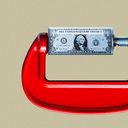The United Steelworkers’ long history of influencing Wall Street mergers

When President Biden spoke out Thursday against Japan-based Nippon Steel's planned $14.9 billion acquisition of U.S. Steel, it was a win for the United Steelworkers union — it's been blasting the deal for months.
Why it matters: The union's political influence stems from labor's heightened leverage in an election year — but a less understood factor involves the Steelworkers themselves.
- The union has a long history of influencing corporate M&A dating back to the 1980s when the steel industry was first upended by foreign competition.
Catch up quick: "[I]t is vital for it to remain an American steel company that is domestically owned and operated," Biden said.
- He called union president David McCall to "reiterate that he has the steelworkers' back," the White House said.
- The president could block this deal if CFIUS, the Committee on Foreign Investment in the U.S., recommends he do so.
- U.S. Steel shares dropped about 6% on Thursday — they're trading at a 30% discount to Nippon's offer.
Zoom in: Biden's opposition to this deal comes after months of lobbying from both the union and Ohio-based steel company Cleveland-Cliffs, the WSJ reported.
- Cleveland-Cliffs tried to buy U.S. Steel last year, in a deal the union supported.
- One of Cleveland-Cliffs' board members, Ron Bloom, is a former adviser to the union. He was a "key player" in 2007 when the union blocked the acquisition of steelmaker Wheeling-Pittsburgh by Brazil's CSN, notes a company press release from January.
The big picture: Decades ago, the steelworkers union started playing an active role in M&A after the steel industry began shrinking.
- "Instead of confronting management with traditional demands, the steel union decided its best hope for preserving jobs and benefits was to back good companies that could make money," reported the WSJ in 2007.
- "It began trying to pick winners and losers, often diving into restructuring battles."
They often played a role in shaping the deals themselves. In 2001, the union agreed to back Wilbur Ross's acquisition of LTV Steel, out of bankruptcy, if he put aside some profits from the new entity into a trust for steelworker retirees. Ross agreed.
- The union blocked the Wheeling-Pittsburgh deal by wielding a clause in their labor contract that gave them veto power. The union then sided with another buyer, Esmark — which agreed not to lay off workers. That deal went through.
Fun fact: Last year, Esmark said it wouldn't make a bid for U.S. Steel out of respect for the Steelworkers.
- "The USW was our partner in the successful acquisition of Wheeling Pittsburgh Steel, and we remain close with them," said Esmark CEO Jim Bouchard.
The union has had advisers with a "very sophisticated understanding of how Wall Street works," says John Logan, a labor historian at San Francisco State University.
- He specifically pointed to Bloom, a Harvard MBA who worked at Lazard and later went on to work for the Obama administration.
One way the union wields influence is through detailed successorship clauses explaining what happens if a company is sold.
- Typically, these provisions simply say that an acquirer has to agree to adhere to a union's current bargaining agreement.
- But the Steelworkers' contracts often go further. In U.S. Steel's immediate case, the union has previously said its contract requires any prospective buyer to agree to a new labor deal before a sale can be finalized.
Reality check: A president has only blocked a foreign transaction seven times since 1990.
The bottom line: The union has said that neither Nippon nor U.S. Steel talked to them before the deal was announced.
- That may have been a big mistake, Logan says. In the past, bidders have ignored the Steelworkers at their peril.